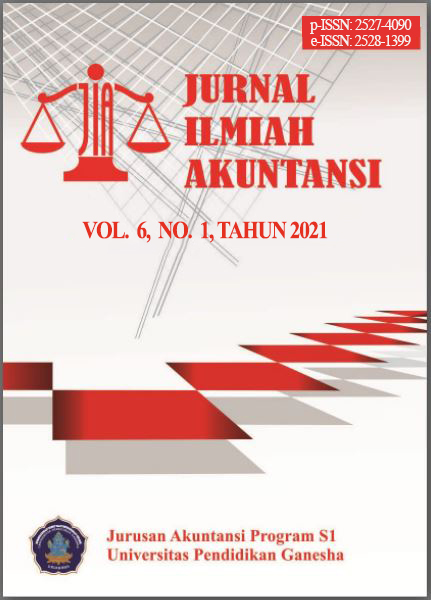Determinant Factor of Small Medium Enterprises to Access Bank Credit
DOI:
https://doi.org/10.23887/jia.v6i1.29907Kata Kunci:
access to bank credit, credit requirements financial literacy, quality of accounting information, small and medium enterpriseAbstrak
This study aims to identify the determinant factors of bank credit access to small and medium enterprises. As the country's economy's backbone, the facts do not make SMEs free from capital constraints. Although the Government of Indonesia has issued a policy regarding lending through financial institutions, it turns out that this support has not played a significant role in encouraging SMEs to obtain bank credit. This research was conducted in Banyumas Regency, with the research respondents being SMEs who had already received credit. The study results found that financial literacy, credit terms, and quality information accounting affect bank credit access. It is concluded that limited access to bank credit can be improved if SMEs understand financial literacy, credit requirements, and accounting information quality.
Referensi
Ajzen, I. (2001). Perceived Behavioral Control, Self-efficacy, Locus of Control, and The Theory of Planned Behavior. Journal of Applied Social Psychology.
Bank Indonesia. (2012). Peraturan Bank Indonesia Nomor 17/12/PBI/2015 Tentang Perubahan Atas Peraturan Bank Indonesia Nomor 14/22/PBI/2012 Tentang Pemberian Kredit Atau Pembiayaan Oleh Bank Umum Dan Bantuan Teknis Dalam Rangka Pengembangan Usaha Mikro, Kecil, Dan Menengah.
Chandra, A. A. (2016). BI: Baru 22% UMKM yang Memiliki Akses ke Perbankan.
Herwiyanti, E., & Sugiarto. (2019). Akses Kredit Bank untuk UMKM. Saraswati Nitisara.
Kitindi, E.G., B., Magembe, & Sethibe, A. (2007). Lending Decision Making and Financial Information: The Usefulness of Corporate Annual Reports To Lender In Botswana. International Journal of Applied Economics and Finance, vol 1(2), pp 55-60.
Lusimbo, N. E., W. M. (2015). Financial Literacy and The Growth of Small Enterprises in Kenya: A Case of Kakamega Central Sub-Country, Kenya. International Journal of Economics, Commerce and Management, pp 828-845.
Maisyaroh, A., & Paramita, R. A. S. (2018). Pengaruh Persyaratan Kredit, Literasi Keuangan, dan Demografi Terhadap Akses Kredit Formal pada UMKM di Sidoarjo. Jurnal Ilmu Manajemen, vol 6(3), pp 270-277.
Nkundabanyanga, S. K. (2014). Lending Terms, Financial Literacy and Formal Credit Accessibility. International Journal of Social Economics, 41, pp 342-361.
Oktavianti, V. (2017). Pengaruh Literasi Keuangan dan Persyaratan Kredit terhadap Akses Kredit Bank pada UMKM di Surabaya. Jurnal Sains Dan Seni ITS, vol 6(1), pp 17-21.
Palazuelos, E., Crespo, Á. H., & del Corte, J. M. (2017). Accounting information quality and trust as determinants of credit granting to SMEs: the role of external audit. Small Business Economics.
Putra, A. A., Herwiyanti, E., & Widianingsih, R. (2018). Pengaruh E-Commerce, Literasi Keuangan, dan Kecakapan UMKM Terhadap Peningkatan Pendapatan UMKM Pengrajin Tahu. Prosiding Simposium Nasional Akuntansi XXI, Samarinda.
Susan, N. P. (2012). Credit Terms, Access to Finance, and Financial Performance of SMEs in Kampala (Dissertation). Tersedia Dari Institutional Repository Makerere University. (Reg.No 2008/HD10/14119U).
Walther, L. M., J, C., & Skousen. (2009). Using Accounting Information. Bookboon.com.
Unduhan
Diterbitkan
Terbitan
Bagian
Lisensi
JIA (Jurnal Ilmiah Akuntansi) is licensed under a Creative Commons Attribution-ShareAlike 4.0 International License
Authors who publish with this journal agree to the following terms:
- Authors retain copyright and grant the journal right of first publication with the work simultaneously licensed under a Creative Commons Attribution Attribution-NonCommercial-NoDerivatives 4.0 International License that allows others to share the work with an acknowledgment of the work's authorship and initial publication in this journal.
- Authors are able to enter into separate, additional contractual arrangements for the non-exclusive distribution of the journal's published version of the work (e.g., post it to an institutional repository or publish it in a book), with an acknowledgment of its initial publication in this journal.
- Authors are permitted and encouraged to post their work online (e.g., in institutional repositories or on their website) before and during the submission process, as it can lead to productive exchanges and earlier and greater citation of published work (See The Effect of Open Access).




1.png)



